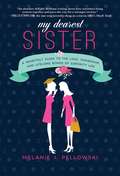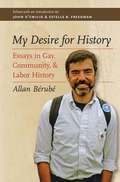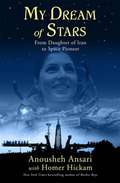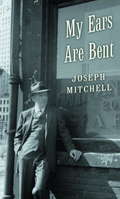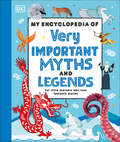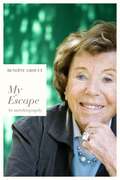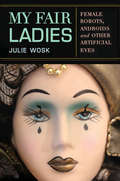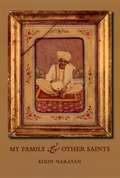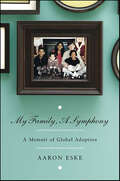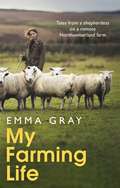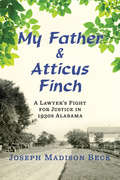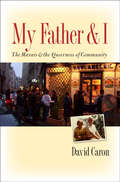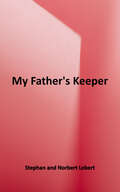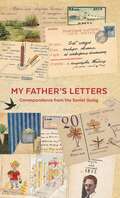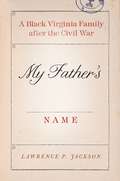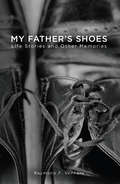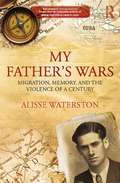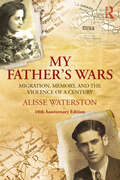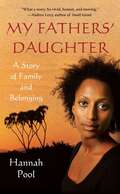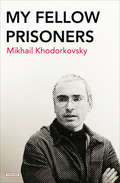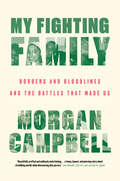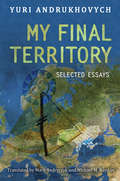- Table View
- List View
My Dearest Sister: A Heartfelt Guide to the Love, Friendship, and Lifelong Bonds of Sorority Life
by Melanie J. PellowskiSatisfy the expectations of sorority newbies and legacies alike by showcasing what makes each chapter special. My Dearest Sister is a sweet and funny interactive journal and a genuine reflection of what real sorority life is all about. Fit for any present, past, or future sorority girl, this cute keepsake honors the spirit, community, and chapter secrets of sororities while leaving room for girls to capture all of their own special memories and traditions in one book for years to come. Inside this heartfelt guide, you’ll discover:The colorful history and tradition surrounding Greek lifeSorority houses, songs, handshakes, and secretsA personalized guide to crafting and party planningAlumni chaptersStickers and journal pages to customize your own sorority experienceAnd more! Any sorority girl who's ever craved a time capsule to keep her friendships everlasting and fresh should look no further; My Dearest Sister is the token gift that celebrates womanhood and seals the bonds of sisterhood for life.
My Desire for History
by Allan BérubéThis anthology pays tribute to Allan Berube (1946-2007), a self-taught historian and MacArthur Fellow who was a pioneer in the study of lesbian and gay history in the United States. Best known for his Lambda Literary Award-winning book Coming Out Under Fire: The History of Gay Men and Women in World War II (1990), Berube also wrote extensively on the history of sexual politics in San Francisco and on the relationship between sexuality, class, and race. John D'Emilio and Estelle Freedman, who were close colleagues and friends of Berube, have selected sixteen of his most important essays, including hard-to-access articles and unpublished writing. The book provides a retrospective on Berube's life and work while it documents the emergence of a grassroots lesbian and gay community history movement in the 1970s and 1980s. Taken together, the essays attest to the power of history to mobilize individuals and communities to create social change.
My Dream of Stars: From Daughter of Iran to Space Pioneer
by Homer Hickam Anousheh AnsariIn her heartwarming and empowering memoir, space pioneer Anousheh Ansari tells the story of her childhood in Iran and her family's exodus to America after the Islamic Revolution. After settling down in Texas, Anousheh built a computer technology firm from the ground up, which eventually realized a net worth of $750 million and ultimately allowed her to achieve her childhood dream of spaceflight. In her groundbreaking role as the first-ever female commercial spaceflight participant, her story became politicized and fraught with the prejudices and obstacles she had to overcome as an Iranian woman, culminating in a debate over whether she would be allowed to display both the American and Iranian flags on the sleeve of her spacesuit. After her return to Earth, Anousheh started The Ansari Foundation, a quickly growing nonprofit which supports social entrepreneurship, and is especially committed to ensuring the freedom of women around the world and supporting female entrepreneurs. Ultimately, this evocative story shows the triumph of a woman who has become a role model to people around the globe struggling to overcome economic and cultural barriers, as well as those dreamers who look upon the stars and wish to soar among them.
My Ears Are Bent
by Joseph MitchellAs a young newspaper reporter in 1930s New York, Joseph Mitchell interviewed fan dancers, street evangelists, voodoo conjurers, not to mention a lady boxer who also happened to be a countess. Mitchell haunted parts of the city now vanished: the fish market, burlesque houses, tenement neighborhoods, and storefront churches. Whether he wrote about a singing first baseman for the Brooklyn Dodgers or a nudist who does a reverse striptease, Mitchell brilliantly illuminated the humanity in the oddest New Yorkers.These pieces, written primarily for The World-Telegram and The Herald Tribune, highlight his abundant gifts of empathy and observation, and give us the full-bodied picture of the famed New Yorker writer Mitchell would become.From the Trade Paperback edition.
My Encyclopedia of Very Important Myths and Legends: For Little Learners Who Love Fantastic Stories (My Very Important Encyclopedias)
by DKThis exciting introduction to myths and legends is brimming with magical stories from the very furthest corners of the world.From the long lost city of Atlantis to the mischievous eight-legged god Anansi, get ready for a world of adventure and magic. Read about vicious beasts, such as the basilisk from Europe and Lumaluma from Australia, and heroes such as Japanese Susano-o, Scandinavian Thor, and Greek Odysseus who battle them. Plunge into dark waters to find the long lost city of Atlantis, the Little Mermaid, and the Loch Ness monster, before taking to the skies to learn about Chinese dragons, the powerful Thunderbird from Native America, and Kutkh from Russia. Perfect for children ages 5–9, this book contains retellings of favorite myths as well as less well known ones. Dive into a world of heroes, villains, quests, magic, and mysteries to discover myths and legends from a huge range of different cultures. Combining fun facts with charming and colorful illustrations, this book will encourage children’s imaginations to run off to far away lands and learn about stories that have shaped civilizations today. Learning about myths and legends provides valuable insight for children into other cultures, encouraging them to think about their place in the world, different values, and the similarities and differences between other cultures and their own. It also puts an emphasis on the importance of history and geography. Learning about cultures from all around the world also teaches children to have cultural awareness. From young historians to fiction lovers, this book is ideal for curious youngsters with a thirst for knowledge. My Very Important Encyclopedia of Myths and Legends will captivate children and get them learning, reading, and having fun.
My Escape: An Autobiography
by Benoite GroultThis witty autobiography captures the rich and varied life of a renowned French author and pioneering feminist, through the obstacles and movements in twentieth-century France. Born in 1920 in Paris, Benoite Groult obtained the right to vote only when she was twenty-five years old. She married four times, bore three children, underwent several illegal abortions, became a writer after she turned forty, and a feminist in her fifties. Groult chronicles her experiences and her intellectual developments through successive phases--as an obedient child, an awkward and bookish adolescent, and a submissive wife--until finally becoming a liberated novelist. Here, she recounts the childhood trips she spent with her family, Paris during the occupation, her marriages, motherhood, and her continuous fight for women's rights. At ninety-one years old, she concludes that she has been, and still is, a happy woman--lucky to have captured her freedoms, one by one, paying for them, delighting in them, and loving them. Sexy, chatty, and full of shrewd insight, My Escape covers her years of struggle and success--as a daughter, lover, writer, wife, mother, and reluctant socialite--and draws a portrait of the role of French women in the twentieth century.
My Fair Ladies
by Julie WoskThe fantasy of a male creator constructing his perfect woman dates back to the Greek myth of Pygmalion and Galatea. Yet as technology has advanced over the past century, the figure of the lifelike manmade woman has become nearly ubiquitous, popping up in everything from Bride of Frankenstein to Weird Science to The Stepford Wives. Now Julie Wosk takes us on a fascinating tour through this bevy of artificial women, revealing the array of cultural fantasies and fears they embody. My Fair Ladies considers how female automatons have been represented as objects of desire in fiction and how "living dolls" have been manufactured as real-world fetish objects. But it also examines the many works in which the "perfect" woman turns out to be artificial--a robot or doll--and thus becomes a source of uncanny horror. Finally, Wosk introduces us to a variety of female artists, writers, and filmmakers--from Cindy Sherman to Shelley Jackson to Zoe Kazan--who have cleverly crafted their own images of simulated women. Anything but dry, My Fair Ladies draws upon Wosk's own experiences as a young female Playboy copywriter and as a child of the "feminine mystique" era to show how images of the artificial woman have loomed large over real women's lives. Lavishly illustrated with film stills, artwork, and vintage advertisements, this book offers a fresh look at familiar myths about gender, technology, and artistic creation.
My Family and Other Saints
by Kirin NarayanIn 1969, young Kirin Narayan’s older brother, Rahoul, announced that he was quitting school and leaving home to seek enlightenment with a guru. From boyhood, his restless creativity had continually surprised his family, but his departure shook up everyone— especially Kirin, who adored her high-spirited, charismatic brother. A touching, funny, and always affectionate memoir, My Family and Other Saints traces the reverberations of Rahoul's spiritual journey through the entire family. As their beachside Bombay home becomes a crossroads for Westerners seeking Eastern enlightenment, Kirin’s sari-wearing American mother wholeheartedly embraces ashrams and gurus, adopting her son’s spiritual quest as her own. Her Indian father, however, coins the term “urug”—guru spelled backward—to mock these seekers, while young Kirin, surrounded by radiant holy men, parents drifting apart, and a motley of young, often eccentric Westerners, is left to find her own answers. Deftly recreating the turbulent emotional world of her bicultural adolescence, but overlaying it with the hard-won understanding of adulthood, Narayan presents a large, rambunctious cast of quirky characters. Throughout, she brings to life not just a family but also a time when just about everyone, it seemed, was consumed by some sort of spiritual quest. “A lovely book about the author's youth in Bombay, India. . . . The family home becomes a magnet for truth-seekers, and Narayan is there to affectionately document all of it.”—Body + Soul “Gods, gurus and eccentric relatives compete for primacy in Kirin Narayan's enchanting memoir of her childhood in Bombay.”—William Grimes, New York Times
My Family, A Symphony: A Memoir of Global Adoption
by Aaron EskeBefore Madonna and Angelina Jolie made international adoption fashionable, Aaron Eske grew up in rural Nebraska with four siblings his parents adopted from around the globe. Each one arrived with severe health issues: Meredith was born without toes and was never supposed to walk; Jamie weighed two pounds and had cerebral palsy; and Jordan had his first heart catheter when he was five. His sister Michelle had suffered abuse in India and experienced trauma as a teenager.As an adult, trying to make sense of how his global family came to be, Eske bought a round-the-world plane ticket and journeyed in search of his siblings' origins. He visited the orphanages where they had lived, met the people who had cared for them, and immersed himself in the the world of international adoption with visits to a slum school in India, the landmine-loaded North Korean border, and a tribal prom in an Ethiopian rainforest. The result is a harrowing, complex, and ultimately triumphant story of international adoption that highlights the issues surrounding this increasingly popular parenting option.
My Farming Life: Tales from a shepherdess on a remote Northumberland farm
by Emma GrayAS SEEN ON BBC TWO'S HIT TV-SHOW 'THIS FARMING LIFE''A heartwarming tale of life on the land' Alan Titchmarsh'There's love and loss, challenge and adversity, but above all it's warm, insightful and inspiring' Helen Skelton'Will inspire any reader to look at the countryside - and all those who work there - with newfound appreciation' Jimmy Doherty 'Uplifting, charming and beautifully written' Adam HensonEmma Gray was just twenty-three when she moved to an isolated farm in Northumberland, becoming Britain's youngest solo shepherdess. In the seasons that followed, Emma fell in love with its rolling fields, surrounding forest and sturdy farmhouse, tending her sheep and training her dogs - and even found romance.But when Emma finds herself suddenly alone again, heartbroken and recovering from a serious accident, she wonders if her isolated existence is still such a sensible idea. Even if she recovers, how could she make a proper living on Fallowlees Farm?In her heartwarming book, Emma tells the story of how she picked herself up and expanded her cattle herd, added more horses to her menagerie, and became one of the country's most successful breeders and trainers of Border Collies - unexpectedly discovering true love and lasting happiness along the way.Written with warmth and humour, My Farming Life is a joyous celebration of nature and community, and a delight for anyone who's ever dreamed of living closer to the countryside.
My Farming Life: Tales from a shepherdess on a remote Northumberland farm
by Emma GrayAS SEEN ON BBC TWO'S HIT TV-SHOW 'THIS FARMING LIFE''A heartwarming tale of life on the land' Alan Titchmarsh'There's love and loss, challenge and adversity, but above all it's warm, insightful and inspiring' Helen Skelton'Will inspire any reader to look at the countryside - and all those who work there - with newfound appreciation' Jimmy Doherty 'Uplifting, charming and beautifully written' Adam HensonEmma Gray was just twenty-three when she moved to an isolated farm in Northumberland, becoming Britain's youngest solo shepherdess. In the seasons that followed, Emma fell in love with its rolling fields, surrounding forest and sturdy farmhouse, tending her sheep and training her dogs - and even found romance.But when Emma finds herself suddenly alone again, heartbroken and recovering from a serious accident, she wonders if her isolated existence is still such a sensible idea. Even if she recovers, how could she make a proper living on Fallowlees Farm?In her heartwarming book, Emma tells the story of how she picked herself up and expanded her cattle herd, added more horses to her menagerie, and became one of the country's most successful breeders and trainers of Border Collies - unexpectedly discovering true love and lasting happiness along the way.Written with warmth and humour, My Farming Life is a joyous celebration of nature and community, and a delight for anyone who's ever dreamed of living closer to the countryside.
My Farming Life: Tales from a shepherdess on a remote Northumberland farm
by Emma GrayAS SEEN ON BBC TWO'S HIT TV-SHOW 'THIS FARMING LIFE''A heartwarming tale of life on the land' Alan Titchmarsh'There's love and loss, challenge and adversity, but above all it's warm, insightful and inspiring' Helen Skelton'Will inspire any reader to look at the countryside - and all those who work there - with newfound appreciation' Jimmy Doherty 'Uplifting, charming and beautifully written' Adam HensonEmma Gray was just twenty-three when she moved to an isolated farm in Northumberland, becoming Britain's youngest solo shepherdess. In the seasons that followed, Emma fell in love with its rolling fields, surrounding forest and sturdy farmhouse, tending her sheep and training her dogs - and even found romance.But when Emma finds herself suddenly alone again, heartbroken and recovering from a serious accident, she wonders if her isolated existence is still such a sensible idea. Even if she recovers, how could she make a proper living on Fallowlees Farm?In her heartwarming book, Emma tells the story of how she picked herself up and expanded her cattle herd, added more horses to her menagerie, and became one of the country's most successful breeders and trainers of Border Collies - unexpectedly discovering true love and lasting happiness along the way.Written with warmth and humour, My Farming Life is a joyous celebration of nature and community, and a delight for anyone who's ever dreamed of living closer to the countryside.
My Father and Atticus Finch: A Lawyer's Fight for Justice in 1930s Alabama
by Joseph Madison BeckThe story of Foster Beck, the author's late father, whose defense of a black man accused of rape in 1930s Alabama foreshadowed the trial at the heart of To Kill a Mockingbird. As a child, Joseph Beck heard the stories--when other lawyers came up with excuses, his father courageously defended a black man charged with raping a white woman. Now a lawyer himself, Beck reconstructs his father's role in State of Alabama vs. Charles White, Alias, a trial that was much publicized when Harper Lee was twelve years old. On the day of Foster Beck's client's arrest, the leading local newspaper reported, under a page-one headline, that "a wandering negro fortune teller giving the name Charles White" had "volunteered a detailed confession of the attack" of a local white girl. However, Foster Beck concluded that the confession was coerced. The same article claimed that "the negro accomplished his dastardly purpose," but as in To Kill a Mockingbird, there was evidence at the trial to the contrary. Throughout the proceedings, the defendant had to be escorted from the courthouse to a distant prison "for safekeeping," and the courthouse itself was surrounded by a detachment of sixteen Alabama highway patrolmen. The saga captivated the community with its dramatic testimonies and emotional outcome. It would take an immense toll on those involved, including Foster Beck, who worried that his reputation had cast a shadow over his lively, intelligent, and supportive fiancé, Bertha, who had her own social battles to fight. This riveting memoir, steeped in time and place, seeks to understand how race relations, class, and the memory of southern defeat in the Civil War produced such a haunting distortion of justice, and how it may figure into our literary imagination.
My Father and I: The Marais and the Queerness of Community
by David Caron"It is a living museum of a long-gone Jewish life and, supposedly, a testimony to the success of the French model of social integration. It is a communal home where gay men and women are said to stand in defiance of the French model of social integration. It is a place of freedom and tolerance where people of color and lesbians nevertheless feel unwanted and where young Zionists from the suburbs gather every Sunday and sometimes harass Arabs. It is a hot topic in the press and on television. It is open to the world and open for business. It is a place to be seen and a place of invisibility. It is like a home to me, a place where I feel both safe and out of place and where my father felt comfortable and alienated at the same time. It is a place of nostalgia, innovation, shame, pride, and anxiety, where the local and the global intersect for better and for worse. And for better and for worse, it is a French neighborhood."—from My Father and IMixing personal memoir, urban studies, cultural history, and literary criticism, as well as a generous selection of photographs, My Father and I focuses on the Marais, the oldest surviving neighborhood of Paris. It also beautifully reveals the intricacies of the relationship between a Jewish father and a gay son, each claiming the same neighborhood as his own. Beginning with the history of the Marais and its significance in the construction of a French national identity, David Caron proposes a rethinking of community and looks at how Jews, Chinese immigrants, and gays have made the Marais theirs.These communities embody, in their engagement of urban space, a daily challenge to the French concept of universal citizenship that denies them all political legitimacy. Caron moves from the strictly French context to more theoretical issues such as social and political archaism, immigration and diaspora, survival and haunting, the public/private divide, and group friendship as metaphor for unruly and dynamic forms of community, and founding disasters such as AIDS and the Holocaust. Caron also tells the story of his father, a Hungarian Jew and Holocaust survivor who immigrated to France and once called the Marais home.
My Father's Keeper: Children of Nazi Leaders - An Intimate History of Damage and Denial
by Stephan Norbert LebertIn 1959 the German journalist Norbert Lebert interviewed the children of prominent Nazis: Hess, Bormann, Goring, Himmler, Baldur von Schirach (creator of the Hitler Youth), and Hans Frank (governor of Poland). Not knowing what to do with the interviews, he boxed them up and stored them. After Lebert's death, his son Stephan -- also a journalist -- inherited the files. Fascinated by what he found, he set out to re-interview the same people forty years later. Revisiting his father's subjects, Lebert explores how each of them deals with the agonizing question: What does it mean to have a father who participated in mass murder? For the most part, the Leberts found that the children remained intensely loyal to their fathers, regardless of their crimes. Gudrun Himmler, for example, lives in a Munich suburb under her husband's name, keeping secret contacts with other nostalgic Nazis. In fact, Niklas Frank is the only one who rejects his heritage. But when he writes in a popular German magazine of his rage against his father -- a man charged with two million deaths -- hundreds of letters pour in from outraged readers. Whatever your father did, they argue, fathers must always be honored. Remarkable in both its content and its narrative power, My Father's Keeper is an illuminating addition to the dark literature of the Nazi past -- and perhaps of any totalitarianism -- and of how this past continues to haunt the present.
My Father's Letters: Correspondence from the Soviet Gulag
by MemorialA profoundly moving and historical record—letters sent by sixteen fathers imprisoned in the Gulag camps to their children during the 1930s–1950s.&“They will live as human beings and die as human beings; and in this alone lies man&’s eternal and bitter victory over all the grandiose and inhuman forces that ever have been or will be.&” —Vasily Grossman, Life and FateBetween the 1930s and 1950s, millions of people were sent to the Gulag in the Soviet Union. My Father&’s Letters tells the stories of sixteen men—mostly members of the intelligentsia, and loyal Soviet subjects—who were imprisoned in the Gulag camps, through the letters they sent back to their wives and children. Here are letters illustrated by fathers keen to educate their children in science and natural history; the tragic missives of a former military man convinced that the terrible mistake of his arrest will be rectified; the &“letter&” stitched on a bedsheet with a fishbone and smuggled out of a maximum security camp. My Father&’s Letters is an immediate source of life in prison during Stalin&’s Great Terror. Almost none of the men writing these letters survived.&“My Father&’s Letters is well presented and deeply moving. The translation is fluent and all the necessary background information is clearly provided. Some passages conjure up the life of an individual family—and of an entire culture—with heart-breaking vividness.&” —Robert Chandler &“Astoundingly, these stories are not miserable. Yes, the men mention their inadequate shelter, clothing and food, but the overwhelming impact is the expression of their love for their families . . . My Father&’s Letters is beautifully produced.&” —Vin Arthey, Scotsman
My Father's Name: A Black Virginia Family after the Civil War
by Jackson Lawrence P.Armed with only early boyhood memories, Lawrence P. Jackson begins his quest by setting out from his home in Baltimore for Pittsylvania County, Virginia, to try to find his late grandfather's old home by the railroad tracks in Blairs. My Father's Name tells the tale of the ensuing journey, at once a detective story and a moving historical memoir, uncovering the mixture of anguish and fulfillment that accompanies a venture into the ancestral past, specifically one tied to the history of slavery. After asking around in Pittsylvania County and carefully putting the pieces together, Jackson finds himself in the house of distant relations. In the pages that follow, he becomes increasingly absorbed by the search for his ancestors and increasingly aware of how few generations an African American needs to map back in order to arrive at slavery, "a door of no return. " Ultimately, Jackson's dogged research in libraries, census records, and courthouse registries enables him to trace his family to his grandfather's grandfather, a man who was born or sold into slavery but who, when Federal troops abandoned the South in 1877, was able to buy forty acres of land. In this intimate study of a black Virginia family and neighborhood, Jackson vividly reconstructs moments in the lives of his father's grandfather, Edward Jackson, and great-grandfather, Granville Hundley, and gives life to revealing narratives of Pittsylvania County, recalling both the horror of slavery and the later struggles of postbellum freedom. My Father's Name is a family story full of twists and turns--and one of haunting familiarity to many Americans, who may question whether the promises of emancipation have ever truly been fulfilled. It is also a resolute look at the duties that come with reclaiming and honoring Americans who survived slavery and a thoughtful meditation on its painful and enduring history.
My Father's Shoes
by Raymond F. VennareMy Father's Shoes is, at its core, an anthology of short stories. The book is allegoric and the shoes are metaphoric. Unlike most anthologies, however, these stories are an amalgam of themselves. They integrate and coalesce. There is a rhythm and a cadence both in substance and in form.This book was initially written as a gift to my father. I wanted to share certain memories with him that were meaningful and lasting. I wanted him to know, from my perspective, just how important he was in my life. He never really understood the profound impact that he had on the lives of other people -especially his family. Because of that humility, or perhaps in honor of it, I wanted to him know that he truly made a difference in this world.As others read the manuscript they seemed to recognize something of themselves in these stories. A memory. A passage. An incident. A feeling. As they did I became more comfortable with sharing these vignettes of family life.In the end this book is really more about me than my father. But, even more than that, it is about appreciating every circumstance in life however mundane or unremarkable it may seem at the time. These seemingly discrete and unrelated moments actually define who you are, what you become and what matters most in life. At least they did for me.My father always used to say, senza memoria vita non esiste, which in Italian means, 'without memory life does not exist.' These are my memories and this is my inheritance.Raymond F. VennareWhile dedicating a significant and successful portion of his life and career to business, entrepreneurship and science, Raymond's essential orientation is humanistic. He is exquisitely aware of the inter-relatedness of all things.This ability to intrinsically see and understand how disciplines overlap and coincide is Raymond's distinctive gift. He is at home in the intersections of business, culture, art and science, and uses interconnectedness as a catalyst for finding novel ways to forge bonds across disciplines and solve human problems.Raymond has always been driven to express his way of seeing the commonalities of the world. This is reflected in the lifelong diversity and range of his pursuits; through his work as an academically trained art historian, ethicist and businessman and as a multi-disciplinary artist -- painter, writer, musician, and commentator.His current artistic offering is a richly textured memoir, My Father's Shoes, which he is also adapting for stage and audio performance. This vibrant anthology celebrates the capacity of one person to make a lasting difference in the lives of others.With humorous reflection, clanking dishes, wafting aromas, and loving tenderness, it vividly reminds us how we ultimately transfer our human energy trough the stories and memories we create and leave behind.There isn't one ounce of fat in Vennare's writing. Every story is a journey, every sentence a complete thought. This book is not just a good read ... this is Benediction.--Frank Ferraro, Filmmaker and PlaywrightI feel like I know these people, and I care about them and the vivid way they lived. Vennare's courage in the act of remembering his father's life, and revealing his own, is an invitation to all of us to find a way to pass on the stories and memories we hold most dear.--Karen Kern, WriterMy Father's Shoes is a wonderful trip down memory lane. With each chapter read, the pages penned touched my heart and resonated with personal stories of my own family members. The book is a one shoe fits all narrative.--Lillie Leonardi, Author, In the Shadow of a Badge
My Father's Wars: Migration, Memory, and the Violence of a Century
by Alisse Waterston* Winner: International Congress of Qualitative Inquiry, Outstanding Book Award 2016 * My Father’s Wars is an anthropologist's vivid account of her father's journey across continents, countries, cultures, generations, and wars. It is a daughter's moving portrait of a charming, funny, wounded and difficult man. And it is a scholar's reflection on the dramatic forces of history, the experience of exile and immigration, the legacies of culture, and the enduring power of memory. This book is for Anthropology and Sociology courses in qualitative methods, ethnography, violence, migration, and ethnicity.
My Father's Wars: Migration, Memory, and the Violence of a Century (Innovative Ethnographies)
by Alisse Waterston* Winner: International Congress of Qualitative Inquiry Outstanding Book Award 2016 *“My father was born into war,” begins this remarkable saga in Alisse Waterston’s intimate ethnography, a story that is also twentieth-century social history. This is an anthropologist’s vivid account of her father’s journey across continents, countries, cultures, languages, generations—and wars. It is a daughter’s moving portrait of a charming, funny, wounded, and difficult man, his relationships with those he loved, and his most sacred of beliefs. And it is a scholar’s reflection on the dramatic forces of history, the experience of exile and immigration, the legacies of culture, and the enduring power of memory. This book is for Anthropology and Sociology courses in qualitative methods, ethnography, violence, migration, and ethnicity.
My Fathers' Daughter: A Story of Family and Belonging
by Hannah PoolHannah Pool, a feature writer at The Guardian newspaper in London was born in the small African country of Eritrea in 1974 but her family, being unable to care for her, gave her to a white British couple for adoption shortly after her birth. This book describes her search for and visit to her birth family and her feelings before and after meeting them.
My Fellow Prisoners
by Mikhail KhodorkovskyThe Russian oil mogul and activist offers reflections on his decades-long incarceration under Putin in this &“illuminating and brave&” prison memoir (The Washington Post). Mikhail Khodorkovsky was Russia&’s most successful businessman—and an outspoken critic of the Kremlin. As his oil company Yukos revived the Russian oil industry, Khodorkovsky began sponsoring programs to encourage civil society and fight corruption. Then he was arrested at gunpoint. Sentenced to ten years in a Siberian penal colony on fraud and tax evasion charges in 2003, Khodorkovsky was put on trial again in 2010 and sentenced to fourteen years on new charges that contradicted the previous ones. While imprisoned, Khodorkovsky fought for the rights of his fellow prisoners, going on hunger strike four times. After he was pardoned in 2013, he vowed to continue fighting for prisoners&’ rights, and this book is dedicated to that work. A moving portrait of the prisoners Khodorkovsky met, My Fellow Prisoners is an eye-opening account of Russia&’s brutal prison system. &“Vivid, humane and poignant&” —Financial Times
My Fighting Family: Borders and Bloodlines and the Battles That Made Us
by Morgan CampbellThe debut memoir from award-winning journalist Morgan Campbell: an incredible history of a family&’s battles across generations, a hilarious and emotional coming-of-age story, and a powerful reckoning with what it means to be Black in Canada—particularly when you have strong American roots.Morgan Campbell comes from &“a fighting family,&” a connection and clash that reaches back to the south side of Chicago in the 1930s. His father&’s and mother&’s families were both part of the Great Migration from the U.S. rural south to the industrial north, but a history of perceived slights and social-class differences solidified a great feud that only intensified over the course of the century after the families came together in marriage and split up across the border.Morgan&’s maternal grandfather, Claude Jones—a legendary grudge-holder, as well was an accomplished musician, peer of Oscar Peterson, and fixture of the Chicago jazz scene—was recruited to play some shows in Toronto, fell in love with the city, and eventually settled in Canada in the mid-1960s, paving the way for Morgan&’s parents to join him amid the tumult of the Vietnam War and the Civil Rights movement. Morgan&’s paternal grandmother, Granny Mary, however, remained stateside, a distance her schemes and resentments would only grow to fill. That fighting spirit wasn&’t limited to the family&’s own squabbles, though—it animated the way every generation moved through the world. From battling back as a group against white supremacist newcomers who violently resisted Black neighbours, to Morgan&’s pre-teen mother burnishing her own legend by cold-cocking some racist loudmouth bullies, the lesson was clear: sometimes words weren&’t enough.In Canada, the Campbells started a family of their own, but the tensions between in-laws never ceased, even as divorce and disease threatened the very foundations of the life they&’d built. Bearing witness to all of this was young Morgan, an aspiring writer, budding star athlete, and slow-jam scholar, whose deep American roots landed him an outsider status that led to its own schoolyard scraps and exposed the profound gap between Canada&’s utopian multicultural reputation and the very different reality. Having grown up bouncing between these disparate identities and nationalities, real or imagined—Black and Canadian, Canadian and American, Campbell and Jones—My Fighting Family is a witty, wise, rich, and soulful illumination of the journey to find clarity in all that conflict.
My Final Territory: Selected Essays
by Mark Andryczyk Yuri Andrukhovych Suhrkamp Verlag Ag Represented by Michael NaydanYuri Andrukhovych is one of Ukraine’s preeminent authors and cultural commentators. In recognition of his literary writings and his role as public intellectual he has received numerous awards including the Herder Prize, Hannah Arendt Prize, and the Goethe Medal.My Final Territory is a collection of Andrukhovych’s philosophical, autobiographical, political, and literary essays, which demonstrate his enormous talent as an essayist to the English-speaking world. This volume broadens Andrukhovych’s international audience and will create a dialogue with Anglophone readers throughout the world in a number of fields including philosophy, history, journalism, political science, sociology, and anthropology. In their introduction Michael Naydan and Mark Andryczyk reveal a somewhat lesser-known side of Andrukhovych’s writings that place him alongside such writers as recent Belarusian Nobel Prize winner Svetlana Alexievich. Ten of the twelve essays in this volume, including his seminal work “Central-Eastern Revision,” are appearing for the first time in English. My Final Territory showcases Yuri Andrukhovych’s unique voice and provides insight into Ukrainian experience of nationality and identity.
My Final Territory: Selected Essays
by Yuri AndrukhovychYuri Andrukhovych is one of Ukraine’s preeminent authors and cultural commentators. In recognition of his literary writings and his role as a public intellectual he has received numerous awards including the Herder Prize, the Hannah Arendt Prize, and the Goethe Medal. My Final Territory is a collection of Andrukhovych’s philosophical, autobiographical, political, and literary essays, demonstrating his enormous talent as an essayist to the English-speaking world. This volume broadens Andrukhovych’s international audience and will create a dialogue with anglophone readers throughout the world in a number of fields including philosophy, history, journalism, political science, sociology, and anthropology. In their introduction, Mark Andryczyk and Michael M. Naydan reveal a somewhat lesser-known side of Andrukhovych’s writings that places him alongside such writers as recent Belarusian Nobel Prize winner Svetlana Alexievich. Eleven of the fourteen essays in this volume, including his seminal work "Central-Eastern Revision" and a brand-new essay on the Russo-Ukrainian War, appear here for the first time in English. My Final Territory showcases Yuri Andrukhovych’s unique voice and provides insight into the Ukrainian experience of nationality and identity.
